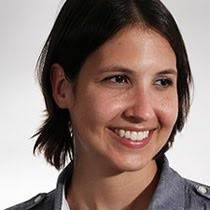Phil and I went up to Johns Hopkins for the first time today. Dr. C, a neuro-otolaryngologist I found through a search on the discussion forum, was willing to see me on his off-day, only a few days after I initially called to make an appointment.
Our first impression was that even though the hospital isn't in the greatest part of town, the facility itself seems really good. The security at the entrances is reassuring, and the staff is very friendly and helpful. After we headed up to the appropriate floor, we found that the patient intake system is organized with a numbered ticket dispenser, which allows for patient confidentiality as well as creates confidence among the patients that they aren't being forgotten.
The appointment with Dr. C went well. We met first with a younger resident-type guy who took my history and cleaned a glob of wax out of my left ear. Then Dr. C came in and went over the treatment options (watch & wait, surgery, and radiation), focusing on the retrosigmoid surgical procedure. He said that, at Hopkins, they're excellent at retrosigmoid, good at translab, and they don't do middle fossa, and he talked to us about what to expect post-surgery in terms of headaches, loss of balance, and general recovery.
Dr. C also did a thorough examination of my current state of balance by asking me to do some marching in place with my arms extended and my eyes closed, and he checked my vestibular function by turning my head quickly and seeing if my eyes were able to stay focused on his nose. I was able to pass these tests, meaning that my balance nerve was still working and that I may have a harder time after surgery since my other vestibular nerve hasn't done a lot of compensating already.
At the end of the appointment, Dr. C said that I should make an appointment with Dr. T, the neurosurgeon, and schedule a new audiogram. He also gave me the surgical consent forms to look over and bring back next time I saw him if I wanted to have surgery there.
Overall, our impressions of Johns Hopkins and Dr. C were extremely positive, and we left there smiling and feeling very confident that these doctors would take good care of me.
(In the interest of full disclosure, this post was actually written on 1/30/09.)
Tuesday, November 25, 2008
Tuesday, November 18, 2008
Need more advice
I had been thinking about Georgetown vs. House for a week when I decided to ask the folks on the forum for advice. They agreed with my inclination to get another opinion at Johns Hopkins and shared with me their stories of how they decided on treatment. It was very helpful to hear from everybody and gave me confidence to keep researching.
(In the interest of full disclosure, this post was actually written on 1/30/09.)
(In the interest of full disclosure, this post was actually written on 1/30/09.)
Thursday, November 13, 2008
Hello again
I met with Dr. J at Georgetown again. I explained to him what the House docs told me and said that I was thinking about doing translab instead of retrosigmoid. He seemed disappointed but said that if that was what I wanted, he could do it. Then I asked him a couple of questions about things I read related to what you can and cannot do after surgery. At the end of the appointment, he gave me the name of his surgical coordinator and told me to schedule as soon as possible since he was booking up pretty far in advance.
(In the interest of full disclosure, this post was actually written on 1/30/09.)
(In the interest of full disclosure, this post was actually written on 1/30/09.)
Thursday, November 6, 2008
I'm in the driver's seat
Dr. S, the neurosurgeon from the House Clinic, called me at work today. Here are his thoughts:
I was considering going out to the House Clinic in Los Angeles at this point, but I wanted to hear what Dr. J said locally before I made any commitments one way or the other.
(In the interest of full disclosure, this post was actually written on 1/30/09.)
- Since I am 26, it must be treated; no watch and wait. He would be reluctant to do radiation on a young person, but it could be done. His recommendation would be surgery.
- He felt that the shape of the tumor looks unfavorable for saving the hearing.
- In terms of his recommended approach, he felt that the tumor was slightly too large to attempt middle fossa, as it would increase the risk to the facial nerve. He wouldn't do retrosigmoid either because it would be difficult to get it all out of the IAC. He thought that translab would be the best way to get it all, but that I might want to wait until we established that it was actually growing.
- He thought that I should get an MRI every three months until we see growth compared to the first MRI.
- His suggestions for reasonable "next steps" were: 1) wait for growth, then do translab, 2) do translab now, and 3) do retrosigmoid now.
I was considering going out to the House Clinic in Los Angeles at this point, but I wanted to hear what Dr. J said locally before I made any commitments one way or the other.
(In the interest of full disclosure, this post was actually written on 1/30/09.)
Subscribe to:
Comments (Atom)
